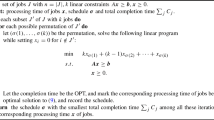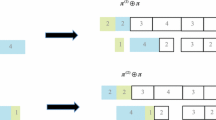Abstract
The paper considers the flow shop scheduling problems to minimize the makespan, provided that an individual precedence relation is specified on each machine. A fairly complete complexity classification of problems with two and three machines is obtained.
Similar content being viewed by others
References
M.R. Garey, D.S. Johnson, and R. Sethi, “The complexity of flowshop and jobshop scheduling,” Math. Oper. Res., vol. 1, pp. 117–129, 1976.
V.S. Gordon and Y.M. Shafransky, “Optimal sequencing under series-parallel precedence constraints,” Doklady Akademii Nauk BSSR, vol. 22, pp. 244–247, 1978 (in Russian).
L.A. Hall and D.B. Shmoys, “Jackson's rule for single machine scheduling: Making a good heuristic better,” Math. Oper. Res., vol. 17, pp. 22–35, 1992.
S.M. Johnson, “Optimal two-and three-stage production schedules with setup times included,” Naval Res. Log. Quart., vol. 1, pp. 61–68, 1954.
E.L. Lawler, “Optimal sequencing of a single machine subject to precedence constraints,” Manag. Sci., vol. 19, pp. 544–546, 1973.
E.L. Lawler, J.K. Lenstra, A.H.G. Rinnooy Kan, and D.B. Shmoys, “Sequencing and scheduling: Algorithms and complexity,” in Handbooks in Operations Research and Management Science, Logistics of Production and Inventory, S.C. Graves, A.H.G. Rinnooy Kan, and P.H. Zipkin (Eds.), North-Holland, Amsterdam et al., 1993, vol. 4, pp. 445–522.
J.K. Lenstra, A.H.G. Rinnooy Kan, and P. Brucker, “Complexity of machine scheduling problems,” Ann. Discr. Math., vol. 1, pp. 343–362, 1977.
C.L. Monma, “The two-machine maximum flow time problem with series parallel precedence constraints: An algorithm and extensions,” Oper. Res., vol. 27, pp. 792–797, 1979.
C.L. Monma, “Sequencing to minimize the maximum job cost,” Oper. Res., vol. 28, pp. 942–951, 1980.
C.L. Monma and J.B. Sidney, “Sequencing with series-parallel precedence constraints,” Math. Oper. Res., vol. 4, pp. 215–234, 1979.
Y.M. Shafransky and V.A. Strusevich, “The open shop scheduling problem with a given sequence of jobs on one machine,” Naval Res. Log., vol. 45, pp. 705–731, 1998.
J.B. Sidney, “The two-machine maximum flow time problem with series parallel precedence relation,” Oper. Res., vol. 27, pp. 782–791, 1979.
V.A. Strusevich, “Shop scheduling problems under precedence constraints,” Ann. Oper. Res., vol. 69, pp. 351–377, 1997.
V.S. Tanaev, V.S. Gordon, and Y.M. Shafransky, Scheduling Theory: Single-Stage Systems, Kluwer Academic Publishers: Dordrecht et al., 1994.
V.S. Tanaev, Y.N. Sotskov, and V.A. Strusevich, Scheduling Theory: Multi-Stage Systems, Kluwer Academic Publishers: Dordrecht et al., 1994.
Author information
Authors and Affiliations
Rights and permissions
About this article
Cite this article
Gladky, A., Shafransky, Y. & Strusevich, V. Flow Shop Scheduling Problems Under Machine–Dependent Precedence Constraints. Journal of Combinatorial Optimization 8, 13–28 (2004). https://doi.org/10.1023/B:JOCO.0000021935.66577.09
Issue Date:
DOI: https://doi.org/10.1023/B:JOCO.0000021935.66577.09




